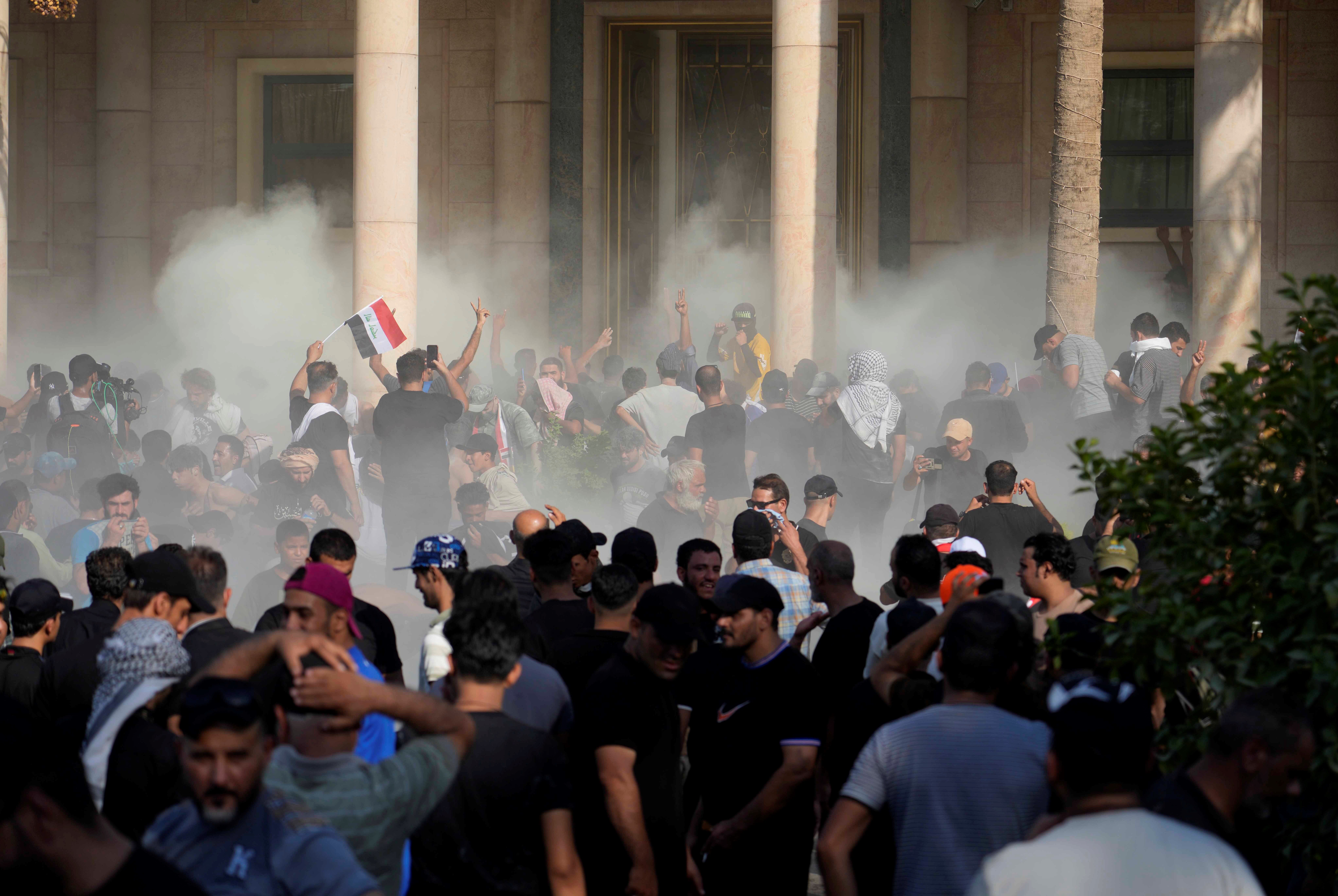Coordination Framework calls on Sadrist movement for dialogue
The Coordination Framework in Iraq comments on Monday's events in the Green Zone and calls on the Sadrist movement to join the dialogue process.
-

Iraqi security forces fire tear gas on the followers of Shiite cleric Muqtada al-Sadr inside the government Palace, Baghdad, Iraq, Monday, Aug. 29, 2022 (AP Photo/Hadi Mizban)
The Iraqi Coordination Framework said Monday it was closely following up on the demonstrations of the Sadrist movement, which led to attacks on the state's institutions.
"Today's developments are concerning, and they included violations against several government buildings in the central and southern governorates," the Coordination Framework said in a statement. "We assert our solidarity with the state and its institutions, as we cannot be neutral when the state's institutions are under attack."
The Coordination Framework also indicated that "the government and security apparatuses must do what is dictated by their national duty to protect state institutions and public interests."
The Coordination Framework called on all religious, political, and social parties to intervene and undermine any attempts to sow discord.
The main political leaders of Iraq agreed earlier in the month to work on a political road map that culminates with a solution to the impasse that has had a hold on the country for nearly a year, but key political leader Muqtada Al-Sadr was not present at the talks called for by Prime Minister Mustafa Al-Kadhimi.
Iraqi Prime Minister Mustafa Al-Kadhimi met with top national officials and party leaders on Wednesday to discuss the political state of the country and the deadlock it is undergoing without the participation of the leader of the Sadrist movement.
Nearly a year after the country's general election, Baghdad is still running without a new government, prime minister, and president due to domestic disagreement about forming a coalition.
The Coordination Framework in the country wants to set conditions, and it is also demanding a transitional government ahead of fresh polls in the country. However, political rival Al-Sadr has been calling for the dissolution of parliament for months in order to pave the way for new elections.
The Iraqi authorities imposed a nationwide curfew at 19:00 local time (16:00 GMT) on Monday until further notice, the Iraqi Security Forces Joint Command said in light of ongoing widespread protests.
Leader of the Sadrist movement Muqtada Al-Sadr said earlier today that he was quitting politics. In a tweet, Sadr announced his final resignation from politics and the closure of all his party offices.
He added that "all the institutions" linked to his Sadrist movement will be closed, except the mausoleum of his father, Mohammed Sadeq Al-Sadr, who was assassinated in 1999, and other heritage facilities.
Al-Sadr's supporters have been staging a sit-in outside Iraq's parliament for several weeks, after storming it on July 30 to protest the Coordination Framework's nomination of Mohammad Shiya Al-Sudani for Prime Minister.
Caretaker Prime Minister Iraqi Prime Minister Mustafa Al-Kadhimi convened talks with party leaders earlier this month, but the Sadrists shunned them.
Hundreds of the Sadrist movement's followers broke into Baghdad’s green zone shortly after the movement's leader, Muqtada Al-Sadr, announced his retirement from politics.
An AFP correspondent reported that the protestors broke into the meeting rooms in the governmental buildings, and some of them carried the Iraqi flag while others swam in the Republican Palace's swimming pool.
The correspondent also reported seeing thousands of supporters of the Sadrist movement in the streets of Baghdad outside the Green Zone, heading toward the official presidential residence.
"There are fears of the developments spreading out to Basra after the demonstrators blocked the Algerian street intersection," the chief of Al Mayadeen's bureau in Baghdad reported.
Local media reported that the security forces resorted to using tear gas to disperse protestors gathered around the Presidential Palace.

 4 Min Read
4 Min Read








